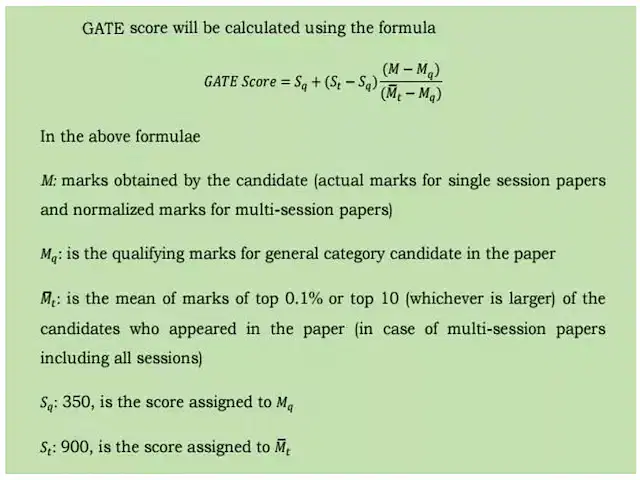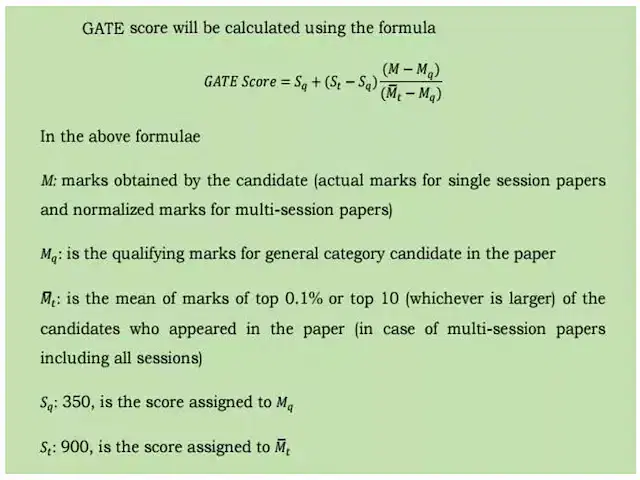As per the GATE marks vs rank analysis, a 90+ score in GATE 2026 can fetch a rank between 1 to 10. Comparing the GATE score with probable ranks can help you analyse their performance, calculate AIRs, and anticipate college allocation.
Table of Contents
According to the GATE marks vs rank vs score analysis, a GATE score between 85 and 87 can fetch a rank between 50 to 100. By checking and comparing one's GATE marks with rank, candidates can derive All India Ranks (AIRs), their position, performance in the examination and anticipate their college allocation during the GATE counselling 2026.
The GATE is one of the highest competitive exams in India, conducted for admission to Master's and PhD programmes in engineering and science streams. Given the difficulty level of the exam, the stakes are always high during the admission.
Thus, the GATE marks vs rank vs score analysis can provide aspirants with an indication of their college allocation even before the GATE 2026 result is out. A detailed analysis of the GATE marks, rank and score is provided below.
Expected Branch-wise GATE Marks vs Rank Analysis 2026
A look at the comparison of branch-wise marks and rank can provide an idea of their chances of admission to their desired course. It will also help them look for other options in their career path. Candidates can have a look at the GATE marks vs rank analysis divided across numerous in-demand subjects from the table below.
Expected GATE Marks vs Rank for Mechanical Engineering 2026
The GATE marks vs rank analysis for the Mechanical Engineering branch is provided in the table below:
|
GATE Marks |
GATE Rank |
|
92 and above |
1 - 10 |
|
87 - 92 |
11 - 50 |
|
85 - 87 |
51 - 100 |
|
82 - 85 |
101 - 200 |
|
79 - 82 |
201 - 500 |
|
75 - 79 |
501 - 1000 |
|
71 - 74 |
1001 - 2000 |
|
63 - 71 |
2001 - 5000 |
|
51 - 63 |
5001 - 10000 |
Also Read: GATE Rank Required for PSUs like ONGC, IOCL
Expected GATE Marks vs Rank for Computer Science Engineering 2026
Computer Science Engineering is one of the most in-demand engineering specializations under GATE. Thus, candidates must understand that a high score on the exam cannot always guarantee a job at PSU or the IITs. Candidates must go through the group discussion and interview rounds.
The following is the GATE rank vs marks analysis for the Computer Science Engineering (CSE) branch:
|
GATE Marks |
GATE Rank |
|
80 and above |
1 - 10 |
|
75 - 80 |
11 - 50 |
|
72 - 75 |
51 - 100 |
|
68 - 72 |
101 - 200 |
|
62 - 68 |
201 - 500 |
|
56 - 62 |
501 - 1000 |
|
50 - 56 |
1001 - 2000 |
|
40 - 50 |
2001 - 5000 |
|
32 - 40 |
5001 - 10000 |
Expected GATE Marks vs Rank for Civil Engineering 2026
The civil engineering programme marks and rank comparison under the GATE exam are given in the table below:
|
GATE Marks |
GATE Rank |
|
90 and above |
1 - 10 |
|
85 -90 |
11 - 50 |
|
78 - 85 |
51 - 100 |
|
74 - 78 |
101 - 200 |
|
70 - 74 |
201 - 500 |
|
64 -70 |
501 - 1000 |
|
57 - 64 |
1001 - 2000 |
|
50 - 57 |
2001 - 5000 |
|
40 -50 |
5001 - 10000 |
Also Read: What is a Good Score in GATE Biotechnology 2026?
Expected GATE Marks vs Rank for Electrical Engineering (EE) 2026
The GATE marks vs rank details for the electrical engineering branch are provided below. The marks are out of 100:
|
GATE Marks |
GATE Rank |
|
91 and above |
1 - 10 |
|
87 - 91 |
11 - 50 |
|
84 - 87 |
51 - 100 |
|
81 - 84 |
101 - 200 |
|
77 - 81 |
201 - 500 |
|
72 - 77 |
501 - 1000 |
|
66 - 72 |
1001 - 2000 |
|
57 - 66 |
2001 - 5000 |
|
46 - 57 |
5001 - 10000 |
Expected GATE Marks vs Rank for Electronics Engineering 2026
Candidates must note that GATE marks and rank vary according to streams. Electronics engineering GATE marks vs rank analysis is provided in the table below:
|
GATE Marks |
GATE Rank |
|
73 and above |
1 - 10 |
|
67 - 73 |
11 - 50 |
|
63 - 67 |
51 - 100 |
|
60 - 63 |
101 - 200 |
|
56 - 60 |
201 - 500 |
|
50 - 56 |
501 - 1000 |
|
45 - 50 |
1001 - 2000 |
|
38 - 45 |
2001 - 5000 |
|
28 - 38 |
5001 - 10000 |
Expected GATE Marks vs Rank for Electronics and Communication Engineering 2026
The GATE marks vs rank is listed below for the ECE programme:
|
GATE Marks |
GATE Rank |
|
73 and above |
1 - 10 |
|
67 - 73 |
11 - 50 |
|
63 - 67 |
51 - 100 |
|
60 - 63 |
101 - 200 |
|
56 - 60 |
201 - 500 |
|
50 - 56 |
501 - 1000 |
|
45 - 50 |
1001 - 2000 |
|
38 - 45 |
2001 - 5000 |
|
28 - 38 |
5001 - 10000 |
Also Read: What is a Good GATE Score 2026?
What's the Difference Between GATE Rank vs Marks vs Score?
How are the All India Ranks (AIRs) calculated? Why are marks converted into ranks? What is a GATE score and marks? These are some of the many questions that GATE aspirants often ask after the GATE exam is concluded. The answer can be found when candidates understand the difference between GATE rank, marks and scores.
GATE Marks: The GATE marks are referred to the mark assigned to each question. The GATE exam pattern consists of a total of 65 questions, carrying 100 marks. These marks are indicative of the candidate's performance in the examination, showing the marks achieved out of 100.
GATE Score: The GATE score represents the percentile score achieved out of 1000 after the normalisation of the GATE marks. It reflects the relative performance of candidates.
GATE Rank: On the other hand, the GATE All India Rank is determined from the marks obtained in the exam. After analysing the candidate's marks, a particular rank is assigned to each student.
Based on this AIR, the candidate can seek PG admission in the GATE participating colleges. Notably, candidates must not mistake GATE marks for rank. While AIR 400 in the GATE exam can get a candidate into IITs, 400 marks in the exam will get them into lower-ranking colleges.
How is the GATE Score Calculated?
The GATE exam is conducted in multiple sessions. Often, candidates only appear for one session of the GATE exam or both. The marks calculated based on a single session require extra attention for the GATE marks vs rank analysis as these will be used to calculate the GATE score.
The following formula is used to calculate the GATE score for a single session:

For GATE papers administered in both sessions, the raw marks matching the normalized scores of the candidates will be taken into account. Here's how:

Also Read: GATE Normalisation Process 2026
Actual GATE Marks vs Normalised GATE Marks
Now, candidates must have repeatedly read the word "Normalised Marks." Let's understand what exactly is. What is the difference between GATE actual marks and normalised marks? The following is the difference between actual marks and normalised marks in GATE:
Actual GATE Marks: The GATE marks are the raw marks obtained by a candidate out of 100. These marks are only used to calculate the GATE score.
GATE Normalised Marks: Since the GATE exam is conducted in multiple sessions, the difficulty level of each paper is different. To ensure fair allocation of ranks, the authorities use the normalisation method. The normalisation method follows an assumption that "in all multiple-session GATE papers, the distribution abilities of the candidates is the same across all sessions."
What is a Good GATE Rank 2026?
"What is a good GATE rank in 2026?" It is a burning question among most aspirants seeking jobs at PSUs and top-ranking IITs.
Well, a good rank in GATE 2026 is 1,000 for admission into candidates' preferred branches in IITs or NITs. However, a rank under 200 can confirm a call from PSU. Notably, the GATE rank 2026 can differ according to the branch.
Candidates must note that even a high score or rank in GATE doesn't always guarantee a job at a PSU. Most PSUs conduct a GD round or interview, cracking which requires a good amount of preparation.
GATE Toppers Marks vs Rank Analysis
Now that it is clear what is a good GATE rank 2026 is, it's time to look at the toppers' ranks to understand where a candidate stands in the pool of competitive candidates. As mentioned earlier, the following table shows the GATE marks vs rank analysis of the toppers of 2024.
This is an overall GATE mark vs score analysis since the scores differ across branches:
|
Paper Name |
Name of the Candidate |
Raw Marks (Out of 100) |
GATE Score (Out of 1000) |
|
Biotechnology |
Akanksha S |
83 |
1000 |
|
Architecture and Planning |
Gajendra Kumar Sharma |
77 |
981 |
|
Agricultural Engineering |
Pratik Sherke |
75.67 |
1000 |
|
Aerospace Engineering |
Kundan Jaiswal |
86.33 |
962 |
|
Biomedical Engineering |
Sanjeev C Achar |
54.33 |
1000 |
|
Civil Engineering |
Deepak |
87.33 |
989 |
|
Civil Engineering |
Bhanu Pratap Singh |
87.33 |
989 |
|
Chemistry |
Himanshu Papnai |
78 |
1000 |
|
Data Science and Artificial Intelligence |
Ayyagari Sathya Sai Sikar |
90 |
1000 |
|
Electrical Engineering |
Manoj Kumar Sinha |
77 |
1000 |
|
Chemical Engineering |
Adharsh Rai |
73.33 |
1000 |
|
Electronics and Communication Engineering |
Raja Majhi |
84.67 |
1000 |
|
Electrical Engineering |
Shivam |
77 |
1000 |
|
Physics |
Anurag Singh |
78.33 |
1000 |
|
Humanities and Social Sciences (Economics) |
Srijan Shaswat |
70.33 |
940 |
|
Electrical Engineering |
Sai Kiran Adelly |
77 |
1000 |
|
Humanities and Social Sciences (English) |
Ajay Kumar |
83 |
1000 |
|
Geology and Geophysics (Geology) |
Jaydeep Roy |
82.33 |
1000 |
|
Ecology and Evolution |
Dhrubojyoti Patra |
81.67 |
1000 |
|
Computer Science and Information Technology |
Piyush Kumar |
90 |
1000 |
|
Geology and Geophysics (Geophysics) |
Shivam Kumar Rai |
75.33 |
999 |
|
Instrumentation Engineering |
Rishabh Gupta |
82.67 |
984 |
|
Geomatics Engineering |
Vaibhav Sonkar |
79.33 |
1000 |
|
Mathematics |
Suyash Srivastava |
71.33 |
1000 |
|
Mining Engineering |
Anurag Kumar Pathak |
58.33 |
966 |
|
Naval Architecture and Marine Engineering |
Prince Kumar |
55.33 |
1000 |
|
Petroleum Engineering |
Saurabh Kumar |
80.67 |
955 |
|
Metallurgical Engineering |
Hrutidipan Pradhan |
81.67 |
977 |
|
Statistics |
Sinchan Snigdha Adhikary |
89.67 |
1000 |
|
Textile Engineering and Fabric Sciences |
Meenu Munjal |
72 |
1000 |
|
Humanities and Social Sciences (Linguistics) |
Jesu Nazarene Roy |
77.33 |
1000 |
|
Life Sciences (Chemistry, Biochemistry, Zoology) |
Siddhant Bhardwaj |
77.33 |
1000 |
|
Mechanical Engineering |
Suraj Kumar Samal |
84.67 |
1000 |
|
Humanities and Social Sciences (Philosophy) |
Utkarsh Rana |
58.67 |
1000 |
|
Engineering Sciences (Engineering Mathematics, Fluid Mechanics, Solid Mechanics) |
Ghanshyam Girish Damat |
83 |
989 |
|
Humanities and Social Sciences (Psychology) |
Srishti Data |
77.67 |
975 |
|
Production and Industrial Engineering |
Kumar Vishesh |
84.67 |
1000 |
|
Humanities and Social Sciences (Sociology) |
Mohammed Shefin M P |
63 |
1000 |
Also Read: GATE Score Calculation 2026
The GATE rank vs marks vs score analysis is a great way to anticipate the college and course allocation, along with the chances of getting into PSUs. The GATE marks vs rank differ across branches, depending upon the difficulty level of the exam, number of seats available, candidates appearing for the exam, previous year's trends and more. Moreover, it provides a fair idea to the candidates appearing for the next session about how much to prepare.























POST YOUR COMMENT